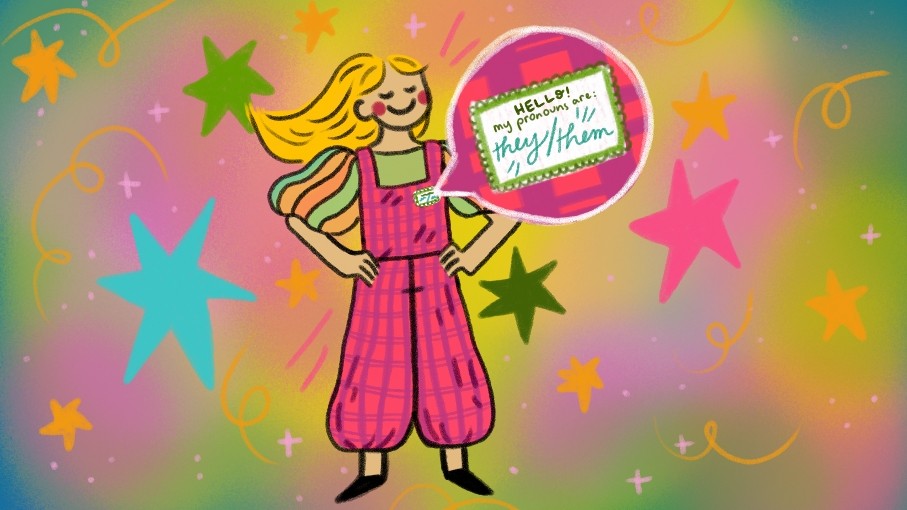Pronouns are funny little things. It’s in their nature—all language, even the stuff that seems simple, can reveal itself to be something paradoxical and complex if you stare at it for long enough. Existing long before you are born, and long after you’re gone, language is social, and belongs to everyone, but can simultaneously feel alienating and detached.
Nevertheless, the meanings within our lives are created by language. We share our deepest truths within language, and it is through language that we try to express the inexpressible. For many queer people, gender can sometimes feel a little inexpressible, but we make do with the linguistic tools we’ve got; pronouns, for example.
When I was a tween, I thought that the barrier to using they/them pronouns was, in my case, the need to be masculine-presenting enough to ‘offset’ some of the physical features I have as someone who is AFAB (assigned female at birth). I thought that I somehow needed to reach a perfect level of androgyny, or perhaps even utter genderlessness in order to feel ‘valid’ and to use my preferred pronouns. This was an extreme amount of unnecessary pressure to put on myself. Your identity cannot be invalidated by someone else’s opinion of your appearance; if it could, everyone—both queer and cisgender—would be considered ‘invalid’ eventually. Despite this, I continued to believe in this fallacy so wholeheartedly that I stepped obliviously back into the closet for about four years, happily assuming that I had just been going through some kind of phase (spoiler: I had not).
After I later came to the shocking realisation that I was in fact non-binary the whole time, and non-binary people can in fact have hair longer than a pixie cut, my world changed. Although I had been wary of experimenting with different pronouns before, I immediately found that ‘they’ worked just as well as ‘she’ for me—in fact, it felt far better. And throughout this journey, I was lucky that I had a supportive group of queer friends to help me figure it out.
Considering how my queer friends relate to their pronouns is interesting, and though I can’t claim a full understanding of anyone else’s headspace, a lot of people seem to have varying experiences with pronouns and their relation to gender. Nevertheless, for most of us, whatever intricacies we hold within us appear to coalesce into the exploration of a couple of simple questions: Does that pronoun feel right? Does it bring you joy?
Neopronouns (literally ‘new’ pronouns; the possibilities are endless) are tools I never thought I would use, but the aforementioned questions can and do apply to pronouns that you might never have heard of in your life. I had always assumed they weren’t for me, but after they eventually came up whilst chatting with a few friends, I was pleasantly surprised to find that they actually had a few neopronouns they enjoyed using. It didn’t seem that weird to me—as an English student, what isn’t linguistically cool about using fun, unconventional sounding words with your friends as a new source of queer joy?
The fairly common idea that neopronoun usage amongst queer people is somehow ‘destroying’ language is likely a symptom of the depressingly common opinion that there is some kind of ‘correct’ form of language. This is a remnant of the misguided belief that, instead of evolving to suit human need, language must for some arbitrary reason remain entirely static. Language has been constantly changing throughout history, so to anyone with hopes of halting the development of language, good luck to you— you’ll need it. Because the fact is that gender, a concept often far too complicated to simply be boiled down to ‘he’, ‘she’, or ‘they’, doesn’t have to be simplified to perceived ‘rules’ of language, especially within accepting communities and social situations. We must catch hold of queer joy whenever we can, and we will.
Amongst queer friends, I know I’m safe within my gender and my pronouns. However, to most people, as someone who is AFAB and generally feminine presenting, I’m a cisgender woman, plain and simple. The discomfort caused to me by the lack of ‘they’ within many people’s vocabulary is often preferable to the unceasing exhaustion of having to potentially irritate acquaintances with corrections and the subsequent obligation to trudge again and again through the explanation not only of what being non-binary is, but also that my femininity does not invalidate it.
I know that I shouldn’t compromise my existence for the comfort of others. None of us should, and it’s something I’m gradually working on. Despite this, I am sharing my experience in the hopes that other queer people might feel a sense of kinship in any aspect of it, no matter which part it may be. If you take anything from this, please keep holding on to queer joy wherever you can find it, whether it’s through pronouns, gender expression, or anything and everything else.

